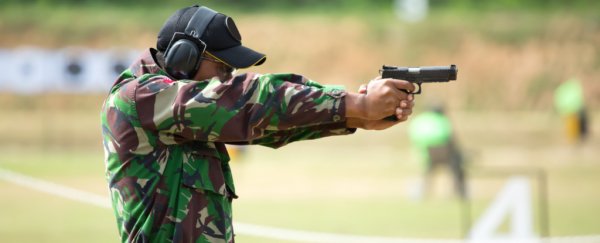You look down the sight of a gun, take aim, slowly exhale, and pull the trigger.
What happens next is an explosion of sensations, from a bright muzzle flash and body-jolting recoil to an ear-splitting bang and acrid smell of burnt gunpowder.
About 72 percent of US adults have fired a gun, according to a June 2017 Pew Research Center survey that reached nearly 4,000 respondents.
This means most of America is familiar with the experience - including the mental and emotional head-rush that often comes with it.
"The whole idea of training is to get people over these sensations, whether they're a police officer-in-training or military personnel," Kevin Fleming, a neuroscientist at Norwich University (a military college) who's researched gun violence and the psychology of shooting firearms for more than 25 years, told Business Insider.
Although everyone's experience is different - especially when it comes to a firing range versus a real-life threat (perceived or otherwise) - here are a few effects that shooting a firearm can have on the brain and body.
The urge to fight or flee may overcome you
Firing a gun can be startling. In response, first-timers can experience a fight-or-flight response - the body's way of automatically responding to what it perceives could be mortal danger.
The brain rapidly releases cortisol, adrenaline (aka epinephrine), and other hormones like serotonin, dopamine, and norepinephrine. This can lead novice shooters to feel intense fear, anxiety, or aggression after shooting.
"In order to pull that trigger, you're standing your ground, and you're going to use this weapon to help you. There is that 'fight' part of it," Fleming said. "I know it's just a paper target, but some people are seeing that as the enemy. … Pulling the trigger is an act of aggression."
Even experienced shooters have to manage their body's responses after firing thousands of rounds in countless training scenarios.
"The training is primarily designed to … bypass all of the emotional baggage of the experience," Fleming said. "But I don't think it ever fully goes away."
Heart rate, blood pressure, and breathing go up
The fight-or-flight response evolved to keep us alive in sticky situations, and spiking hormone levels also triggers a grab-bag of autonomic (i.e. uncontrollable) bodily reactions.
"It's based on our primate heritage," Fleming said. "If you're going to run away from or fight something, you'd better start breathing faster to get enough oxygen in your blood, and pumping that oxygen around."
As a result, the heart begins to race, blood vessels constrict, and blood pressure skyrockets, in turn rapidly delivering oxygen and sugar to muscles.
The mind goes into overdrive
After firing a gun, the brain also benefits from the rush of blood and fight-or-flight levels of neurochemicals.
Mental focus increases, and so does the ability to recognise patterns, while time seems to slow (though it doesn't actually do so) with the increased flow of information.
Palms sweat and pupils dilate
"The sweaty palm helps you get a better grip," Fleming said, and wider-open eyes help you see more of your surroundings, especially in the dark.
The digestive system pauses
The body may also stop processing food.
"You can get sick to your stomach if you've have a big meal," Fleming said. Though it's rare, he added, "you might even get diarrhoea. If you're an animal, you are not going to carry that extra weight if they don't have to. The same thing with urine."
All of these responses happen more or less at once, Fleming said, and often before the brain has consciously processed that a gun has fired.
…But shooting can feel really good, especially after the fact
After the danger has passed, the nervous system responds by releasing all sorts of chemicals to calm the body back to normal, while others that spiked linger for some time.
The initial response and come-down that follows can lead to a strong sense of pleasure and reward in some people.
"That rush of serotonin feels good," Fleming said. "A lot of people don't like being scared, but there are people who like to jump out of aeroplanes or bungee jump."
However, Fleming noted that most professional shooters he's met - primarily police officers and military personnel - aren't adrenaline junkies and espouse a "healthy respect for guns."
"There may be some people who get a thrill out of going to the range," he said. "But most professionals I've met are not that interested. They don't want to bring that home at the end of the day."
This article was originally published by Business Insider.
More from Business Insider:
